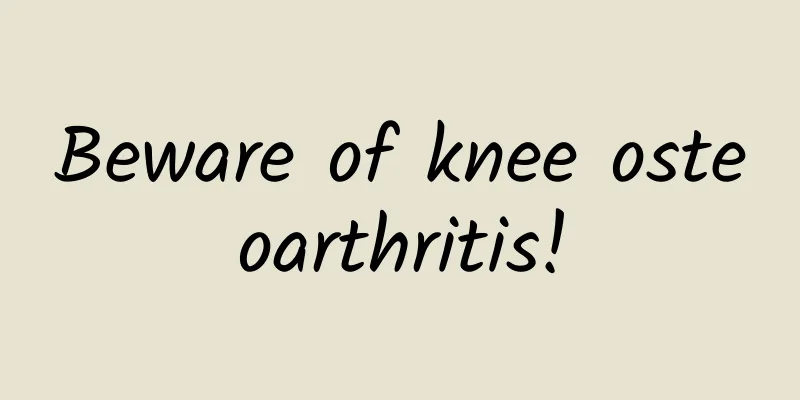Beware of knee osteoarthritis!

|
Do you often feel stiffness, discomfort or even pain in your waist and legs? Doctors remind you: Be careful about knee osteoarthritis! What to do if you have back and leg pain? Doctors remind you: Be careful of knee osteoarthritis! Doctors say Knee osteoarthritis is a common degenerative disease of the knee joint. It often occurs in middle-aged and elderly people and is characterized by chronic cartilage wear. The early symptoms are mild, manifested as joint discomfort and stiffness. Vigorous activities can easily cause acute inflammation and even limited joint movement. Osteoarthritis is mostly related to age. As we age, joint aging gradually worsens. The synovium in the joint and the cartilage on the surface of the joint are the "elastic coating" of the bearing contact surface. Normal synovium and cartilage can absorb shock, bear load, and increase joint flexibility. However, once the synovium and cartilage are lost, it will lead to serious consequences such as knee swelling, pain, bone hyperplasia, and even joint deformation. Is joint pain really caused by freezing? Because the subcutaneous tissue around joints is relatively thin, joints are often more sensitive to temperature changes. In addition, there are abundant nerves around joints, and the relatively low temperature of the joints directly stimulates the sensory nerve endings around the joints, causing pain over time. Cold joints can also cause local capillary contraction, affecting blood circulation around the joints, resulting in insufficient local blood and oxygen supply and pain. In addition, as osteoarthritis wears out, a large amount of inflammatory cytokines are released while secreting joint effusion. These inflammatory cytokines can directly stimulate or accelerate the progression of arthritis through immune inflammatory reactions, while causing increased pain. Cold weather can also directly stimulate the synovium, reducing the amount of synovial fluid it secretes, which increases joint friction. Whenever you suddenly stand up or walk from a resting state, the dryness or soreness of the knee joint becomes more obvious. Osteoporosis is also a problem that cannot be ignored. Since osteoarthritis is mostly a disease of the elderly, and osteoporosis is also the most common among the elderly, osteoporotic bone pain will aggravate the symptoms of osteoarthritis to a certain extent. It can be seen that joint pain caused by cold weather is often caused by multiple factors. If you want to avoid leg pain, keeping warm is the most important thing. The joints are most susceptible to cold, so it is important to maintain a suitable temperature in the joints, and try to avoid getting the joints cold, damp, or blown by cold wind. We can use warming measures on the joints, such as wearing long pants, socks, knee pads and elbow pads to protect the joints. For patients who have already experienced joint pain, hot compresses and physical therapy also have a significant effect on improving blood supply around the joints and promoting the disappearance of inflammatory cytokines. Exercise after the weather gets cold also needs special attention. For people with joint pain, it is recommended to avoid joint weight-bearing exercises. Doctor's reminder [Doctor's reminder] For obese people, a healthy diet combined with moderate exercise to return weight to normal is the key to relieving joint pain. In addition, climbing stairs less and carrying less heavy objects are also important means to reduce the burden on joints. At the same time, some actions that are not good for joints should be avoided as much as possible, such as squatting to pick vegetables, washing clothes, mopping the floor, and crossing your legs, which will cause muscle strain around the joints and aggravate inflammation. For elderly people with osteoporosis, not only do they need to ensure a balanced intake of nutrients such as calcium, vitamin D, vitamin K, protein, magnesium, and zinc, but they should also choose a personalized osteoporosis treatment plan to strengthen their bones. If symptoms such as joint pain, swelling, and difficulty in joint movement occur and gradually worsen, you should still seek medical attention in time and treat the cause. |
<<: These things that we think are signs of good health are actually wrong!
Recommend
Can I have an abortion if I suffer from premature ventricular beats?
Abortion, killing one's own unborn child in a...
Why do girls have kidney pain?
The kidney is a relatively important part of the ...
What anti-inflammatory medicine should I take for clitoral redness, swelling and pain?
In general, redness and swelling of the clitoris ...
A competition of foods that make you poop, bananas are not on the list, you will never guess the first one!
"Constipation" is a pain that many peop...
Why do girls' knees turn red?
There are many types of examinations in the hospi...
What does pink menstrual period color mean?
Normally, women's menstruation is dark red. I...
How to take care of yourself after hysterectomy?
When it comes to the harm of uterine fibroids, I ...
Causes of abdominal pain on both sides of the body after cesarean section
Cesarean section is a surgical procedure that car...
How long can a woman take a bath during confinement?
Confinement is something that Chinese mothers wil...
Be familiar with food traffic lights and lead the new trend of health
"Stop at red lights, go at green lights, and...
Summer care for atopic dermatitis
This is the 3903th article of Da Yi Xiao Hu Atopi...
Is it normal to have itchy episiotomy wound?
Episiotomy during normal delivery is when a woman...
The impact of pregnant mothers crying in anger on their babies
After a woman becomes pregnant, her temperament w...
What is the best way to solve sagging breasts?
Breasts are a part of a woman's body that sho...
Can I apply hot compress during my back pain?
The confinement period is the same as the pregnan...









